



Recently, the field of corporations have a lot of concern about relationship between intrinsic characteristics of members in organization and job achievement of organization in rapid change of situation of corporations. Also, many corporations are planning and accomplishing the establishing institutional infrastructure and the formation of employers' bond of sympathy by utilizing these characteristics. Like this, corporations try to make efforts for maintaining and improving systemicity in the level of corporations. However, information that character type influence on job achievement of organization through some process by real members are not significant. This study investigate the influence factor of character type from members in organization perspective based on the awareness of a problem, and present the process factor that influence on job achievement of organization through character type and emotional quotient in the integrated perspective. As a result, only emotional adjustment among four types that are emotional awareness, emotion of boss, other people's feeling, and emotional adjustment could have positive effects on satisfaction of boss statistically significant. And we find that emotional quotient depending on degree of motivation about job influences on satisfaction of boss significantly. This study suggests policy and institutional ways that can improve job achievement in the level of corporation base on results.
최근 기업현장에서는 급격한 기업환경의 변화 속에서 조직 구성원의 내재적인 특징과 조직의 직무성 과와의 관계에 많은 관심을 가지고 있다. 또한 많은 기업들이 이의 특징을 활용한 경영자의 공감대 형성과 제도적 인프라 구축 등을 실시하고 있거나 추진을 계획하고 있다. 이처럼 기업들은 조직성과 유지 및향상을 위해서 기업차원에서 다양한 노력을 기울이고 있다. 하지만 실제 구성원들이 어떤 과정을 통하여 성격특성이 조직의 직무성과에 영향을 미치는지에 대한 정보는 미미한 실정이다. 본 연구는 이러한 문제 의식을 바탕으로 조직 구성원 관점에서 성격유형의 영향 요인을 찾아보고, 조직의 직무성과에 영향을 주는 과정요인을 성격유형 및 감성지능을 통하여 통합적인 관점에서 밝히고자 하였다. 분석 결과, 조직 구성원들의 감정인식, 상사감정, 타인감정 그리고 감정조절의 감성지능 네 가지 차원 중 감정조절만이 상사 만족에 긍정적인 영향을 미침을 밝혔다. 그리고 직무에 대한 동기부여 정도에 따른 감성지능이 상사 만족에 통계적으로 유의한 영향을 미치는 것으로 발견되었다. 분석결과를 기초로 해서, 본 논문은 기업차원에서 직무성과를 향상 시킬 수 있는 정책적, 제도적 모색방안을 제시하였다.
Recently, the bond of sympathy that human resources is a principal strategic point for maintaining the competitiveness consistently and the core assets is forming in field of firms. Many firms has already arranged employees who are exclusively responsible for selecting, maintaining, development, and managing human resources, and has spent a lot of money for this. Also, they are aware that this expenditure is not the minimized costs but the strategic assets to make future profits. Many researchers emphasize the necessity of the management of human resources efficiently(Allport, 1961; Bennett, Furnham, 2007). For this, they insist that the learning organization should be established and the career development should be proceeded by understanding individual difference and implicit nature of organizational member because all members in organization have personal characteristics which is distinguishing thoughts, emotions, and pattern of behaviors is built by genetic, environmental, and situational elements and these have important properties to carry out works(Cote, Miners, 2006, Colquitt, Wesson, 2009). For the importance, many researchers are conducting research about the relationship between character type of organizational member and systemicity(Barirrick, Mount, 1991).
Human sensitivity would be accurately induced the judgement about information, would help to put important principals to good use when human sensitivity make a complicated judgement and improve the thinking flexibility. That is, the emotional quotient is recognized insights as a source of human information, network, and leverage, and this is ability that could be utilized effectively. Also, emotional quotient could have effects on group intelligence and organizational achievement(Cumming, 2005). If the rationality (or ability of reason) is reasonable thinking ability, emotional ability is represented as control for control the emotions, and the emotional quotient of organizational leader could have effects on the organizational emotional quotient of group. That is, a leader who can lead to harmony and collaboration among its members in the light of emotional quotient can form the bond of sympathy that can achieve effect(Won. 2007; Johson, Cumming, 2005).
Like this, a recent organizational concern that is related to intrinsic attributes of organizations or human, in other words individual or organizational emotional quotient is increasing, attributes and characteristics of each member of organization adjust and fuse, the organization is trying to obtain the process for making the high performer and an organization through activities for improvement of organizational structure that can renew and make purpose and value of team composition clear. However, previous research papers mainly present the relationship between type of characteristics and job outcomes and these papers have limitations that do not present how this relationship happens concretely. Also, although organizational concern and institutional infra construct about the relationship between implicit nature of members and job achievement of organization are processing in a short period of time, problems related to content inequality and lacks of management system are indicated (Colquitt, Wesson, 2008).
Thus, the consideration about concrete content composition and efficient strategy of human resources management is needed for continuous competitiveness maintaining of human resources. Previous research papers did not focus on individual or participation motivation among intrinsic natures of members. Recently, as a participation subject and working area diversify in the field of firms, the need of systematic composition and management of business contents is increased through the participation motivation of members. Also, members want to do activities that are matched by their participation motivation, experiences and abilities, they also want to improve their self efficiency from these activities(Rafaeli, Worline, 2001). If expectation of members does not meet in the field of firms, their willpower to conduct these activities would be weaken and side effects that do not be satisfied the expectation of firms would be happened. Thus, the function and contents of human resources management that are matched individual properties and characteristics are required to solve this problem and to achieve organizational outcome that is purpose of firms efficiently(Steiger, 1990; Wong, Law, 2002). As the importance about the function and contents of human resources management is appearing, the concern about the improvement of participation motivation and satisfaction highly appear for the job achievement and improvement.
According to the big five personality traits theory of Norman's organization action theory, a man's characteristics included in the big five personality traits in psychology that are neurotique, extroversion, congeniality, conscientiousness and openness to experience could have positive or negative effects on the job achievement, and these could affect the job achievement differently depends on emotional quotient(Norman, 1963). When we review this result, we can find that organizational job achievement has relationship directly or indirectly between character type elements of members and participation in job activities.
However, there are not many domestic and international research related to the relationship between character type and systemicity of members in organization. Almost previous research were mostly conducted about variables that could have effects on job achievement(Martin, Mueller, 1981) and psychological elements(Wiggins, Trapnell, 1990) and motivational elements(Pervin, John, 1996). This results have some limitations that do not give us information for specific system and plan that could influence on job achievement through emotional quotient or motivation related to character type. Especially, there is also another limitation which does not present information that could search programs development and building plan to promote the participation of job activities through character type and emotional quotient of members. Like this, nevertheless personal structure type and diverse perspectives about a various of character type and emotional quotient of members who work at firms exist, promoting participation of standardized job types could not provide a lot of information to improve job outcome of organization. Therefore, this study want to solve this problem and to find immanent meanings for job plan considering character type and emotional quotient.
This study improves limitations about character type and emotional quotient of member such as previous research and examine empirically the effects of character type of members on job achievement by utilizing data of members of firms. To achieve this purpose, we want to analyze the effects of character type of members on job achievement by using emotional quotient theory as a mediate variable based on big five personality traits theory of organization action theory and emotional quotient theory. Furthermore, we hope that the result of this study could be utilized as a decision making material for program development and plan that can promote the participation of job activities considering character type and emotional quotient of stable members.
This study has based on the Big Five Theory of characteristic that logically explained dynamic organization process of individual mental and physical system that can determine the individual adaption for firms’ environment. The key point of this study is that characteristic is the efforts of identity and initiative about firms field environment(Pervin, 1990). The Big Five Theory of characteristic was developed by the theory of characters, and many researchers of theoretical evidence separated largely five categories of the individual characteristic(Goldberg, 1990; Goleman, 1995; Hammond, 2001). There are a little be differences about Firstly, extroversion means that the level of comportability which people who can feel this in their human relationship. People who has extroversion would be sociable, conclusive, congeniality, well developed friendship, and self expression or pattern for seeking for independent world are standard. In other words, people who has introversion would be shame, timid, and silent(Goldberg, 1990).
Secondly, agreeableness means that people make way for other, and adapt for environment or society easily. People who has high quality of agreeableness would be collaborate, having credibility and a soft heart, and non-selfish as their characteristics. However, people who has low agreeableness would be cold, fussy, and hostile as characteristics(Hammond, 2001).
Thirdly, in the difference of conscientiousness, if people are faithful, they would be responsible, regular, and reliable. Also, they would be not only good at problem solving but also would be trying to find some satisfied solutions. In other words, people who has low conscientiousness would lose their reason, be scatterbrained and unreliable(Norman, 1963). Fourth is the emotional stability. People who have higher the emotional stability would have ability to endure the stress, would be mild and would have confidence and stability but people who have lower the emotional stability would have a nervous temperament, would be gloomy and unstable. Furthermore, people could be relaxed in their daily life but people would be angry or would respond to several kinds of stressful reaction in a moment when they encounter the unexpected or stressful situation(McAdams, 1992).
Lastly, the openness to experience means the level of interest or concern about new things. People who have higher the openness to experiences would be creative, would have a lot of curiosity, and artistic sensibility while people who have the opposite tendency would be conservative would be comfortable in accustomed environment (Wiggins, 1979; Rhy, Yook, 2009; Rhy, Kim, 2008) investigate whether or not the relation exist between the expenditure about intangible asset of corporations and capital investment of corporations. As a result, there is an interrelationship between the expenditure of intangible asset and capital investment of corporation. Also, one of results show that there is a positive interrelationship between investment of tangible asset and investment of intangible asset.
According Chung, Lim(2010), Paek, Jeon(2004), Ahn et al.,(2005) studies, the expenditure that was related to these capital investment could have effects on the value of corporation ultimately. Although there could be a various ways to analyze the influence of the character type of members in organization on the achievement of organization, for example one method is verifying directly by using character type that was mentioned, this study has employed the emotional quotient theory to investigate how the mediator effect of emotional quotient could affect the relationship between character type and achievement of organization.
This theory means that emotional quotient that people feel could be presented diversely depending on the field situations of corporations and individual experiences. Salovey, Mayer(1990) insisted that the area of emotional quotient has categorized evaluation and expression, adjustment, and utilization of emotion. Also, this area utilizes the emotional quotient by utilizing the information of evaluation and discrimination of one's and others, and then this could lead to their thinking and acts. And the emotional quotient is phenomenon which could be showed inherent characteristics of human, for example individual experienced events, circumstances, and human relationship, to the outside.
Rafaeli, Worline(2001) have categorized and summarized the emotional quotient into four concepts based on these characteristics of the emotional quotient. Firstly, the emotional quotient means the self-awareness, and this means the ability to understand deeply the emotion, strengths, weakness, needs and impetus. That is, as the ability of self-awareness means the human’s value and aims, people who have higher the ability of self-awareness could present correctly and sincerity the influence of jobs of corporations on themselves. Secondly, empathy means the ability to know the subjective experiences of others, and means the ability to re-experience others suffers for themselves with same emotion. That is, empathy has characteristic to be basic of ability of human relationship as another ability that can be constructed with emotional self-awareness.
Thirdly, the ability of emotional quotient could look into their feeling and emotion, could be accompanied the ability of circumlocution after adjusting feeling and emotion and could be constructed based on their self-awareness rather than direct expression about feeling or emotion. Fourthly, the ability of utilizing the emotional quotient lead to goal-oriented act. In other words, this ability could employ their sensitivity to the direction that can obtain the constructive activities and achievement, and lead to appropriate motivation but also achievement beyond expectations from employees. Lastly, empathy is the ability to know others’ subjective experiences, and the ability to re-experience others’ suffers for themselves with same emotion. The structure elements and contents of these emotional quotient are as a below The kinds of Emotion Above mentioned the emotional ability in the table 1, there are 4 major emotional quotient elements and 18 emotional abilities. Reconstructed concepts are in table 2. re-categorized emotional ability Thus, this study applies for the theory of emotional quotient that could be presented depending on individual experience and field situation of corporation and the Big Five Theory that could explain logically dynamic organizational process of intrapersonal metal, physical system deciding individual peculiar adaptation about environment of corporation to investigate empirically the influence of character type of member in organization on achievement of organization through mediator effects of emotional quotient. Above all, as investigate empirically, this study suggests the stable program development and construction ways after considering the character type of member and emotional quotient. There are several kinds of research for establishing strategy and planning the framework for propel to raise the achievement of organization considering character type of members in organization(references). These investigated the influences on character type and emotional quotient, emotional quotient and systemicity, character type and emotional quotient and systemicity, each research is in table 3. The analysis of previous research Above all, some of previous research which investigated the influence of character type on emotional quotient significantly presented that character type could have effects on the development of emotional quotient. Especially, emotional quotient of extrovert have more influence on emotional quotient of introvert(Yoon, 1997). And people who are stable and sociable have higher focusing ability and have higher adaptation in new environment than people who have unstable and unsociable characteristics(Kim, 1990). Especially, character type of extrovert have more positive effects on emotional intelligence than character type of introvert, and agreeableness, conscientiousness, openness to experience variables have positive effects on emotional intelligence. However, emotional stability have negative relationship with emotional quotient(Choi, et al 2006, Won, 2007). The social ability of extrovert is higher than the social ability of introvert and extrovert have more time for human relationship than introvert. Also, the extrovert could experience the more positive feeling than introvert, they can present their these emotion freely and can overcome stress well(Foti, hauensrein, 2007). Lastly, people who have higher openness to experience variable could have higher creativity, and the probability is higher to be a leader, the ability for adaptation and solution of organizational change is more excellent(colquitt et al, 2008). Goaleman(1998) insisted that emotional intelligence could have effects on the systemicity in work aread with statistical significance. In particular, the ability of emotional intelligence is the key variable to achieve the achievement of organization in work area. Cooper, Sawaf(1997) presented that a person who lift up his or her head in organization would have something that would be related to emotional intelligence. Won(1997)’s research which explained the Cooper, Sawf’s opinion in depth showed that understanding other’s feeling, utilization of feeling, and adjusting of feeling influence on achievement of organization with statistical significance. Furthermore, in the international research related to this, Palmer, stough(2001) presented that members who have higher emotional intelligence could adjust their emotion in unsatisfied environment and try to reduce the emotional acts in relationship with customers and colleagues. Cote, Miners(2006) showed that members whose cognitive function is lower than emotional intelligence respectively have positive effects on the achievement of organization statistically. Pervin(1990) conducted the effects of unmatched level of personal and environmental characteristics on organizational validity. In this research, Pervin said that if personal characteristics and environmental characteristics would be matched more and more, achievement of member in organization would be improved. Bennett, Furnhan(2007)’s research verified empirically emotional intelligence has a mediater effect between character type and systemicity relationship. Also, the Batey, Holdsworth's research(2009) verified empirically that emotional quotient shows a mediator effects in the relationship between character type and systemicity. Many of researchers personality measures could be categorised five-factor model of personality (Hogan et al., 1996). The five personality dimensions seem to be relevant to different cultures(McCrae, Costa, 1997) and have been recovered consistently in factor analyses of peer-and self-ratings of trait descriptors involving diverse conditions, samples, and factor extraction and rotation methods(Costa, McCrae, 1988). Research also showed that the five personality factors have a genetic basis(Digman, 1989) and that they are probably inherited(Jang, Livesley, Vernon, 1996). The five dimensions of the five-factor model of personality are Neuroticism, Extraversion, Openness to Experience, Agreeableness and Conscientiousness. Neuroticism is a dimension of normal personality indicating the general tendency to experience negative affects such as fear, sadness, embarrassment, anger, guilt and disgust. High scorers may be at risk of some kinds of psychiatric problems. A high Neuroticism score indicates that a person is prone to having irrational ideas, being less able to control impulses, and coping poorly with stress. A low Neuroticism score is indicative of emotional stability. These people are usually calm, eventempered, relaxed and able to face stressful situations without becoming upset(Hough et al., 1990). Extraversion. Extraversion includes traits such as sociability, assertiveness, activity and talkativeness. Extraverts are energetic and optimistic. Introverts are reserved rather than unfriendly, independent rather than followers, even-paced rather than sluggish. Extraversion is characterised by positive feelings and experiences and is therefore seen as a positive affect(Clark, Watson, 1991). It was found that Extraversion is a valid predictor of performance in jobs characterised by social interaction, such as sales personnel and managers(Bing, Lounsbury, 2000). Openness to Experience includes active imagination, aesthetic sensitivity, attentiveness to inner feelings, a preference for variety, intellectual curiosity and independence of judgement. People scoring low on Openness tend to be conventional in behaviour and conservative in outlook. Research has shown that Openness to Experience is related to success in consulting (Hamilton, 1988), training(Barrick, Mount, 2001) and adapting to change(Bing, Lounsbury, 2000). An agreeable person is fundamentally altruistic, sympathetic to others and eager to help them, and in return believes that others will be equally helpful. The disagreeable person is egocentric, sceptical of others’ intentions, and competitive rather than co-operative(Tett et al., 1991). Conscientiousness refers to self-control and the active process of planning, organising and carrying out tasks(Barrick, Mount, 1993). The conscientious person is purposeful, strong-willed and determined. Conscientiousness is manifested in achievement orientation, dependability(responsible and careful) and orderliness(planful and organised).
The Model of this study includes significance variables that are verified as a related cause and nfluence factors based on theory and previous research related to character type, emotional quotient, job achievement of members in organization(Figure. 1). In this study, SAS 9.3 program is employed for statistical analysis. Above all, Frequency Analysis and Descriptive Analysis are conducted to search the characteristics of assigned group as a sample. And then, Reliability analysis is conducted for measuring the internal consistency of survey items and employed scale is the Cronbach's Alpha. Furthermore, the multiple regression analysis is used for investigate the influence of factors on job achievement of organization. In this study, Cronbach alpha coefficient is employed depending on total items and each component to conduct Reliability analysis. Cronbach alpha coefficient has an advantage that can be used for all kinds of test items. That is, test items can be used for multiple choice items and true-false item of tests that are scored as dichotomous type such as 1 equal to correct and o equal to incorrect. but also supply items and writing items of tests as consecutive items that can be scored like part scores. The coefficient like KR-20 and KR-21 is based on assumption that all items which are composed of test measure the latent traits. The coefficient can be interpret as inter-correlation mean of all items that are composed of one test, and this is usually named the intra-class correlation. Cronbach's coefficient has overcame the limitation of ANOVA proposed by Hoyt and disadvantage of correlation coefficient that is basic of reliability coefficient of test, and this method, which is proposed to get out of every constrain, has the least measurement errors (Whang, 1998). In general, if the value of Cronbach alpth equal and greater than 0.6, we can think that this test would be reliable. In the result of reliability analysis for variables of this study, All variables have Cronbach alpha that are greater than 0.6 such as extroversion(0.715), agreeableness(0.745), conscientiousness(0.654), emotional stability(0.782), openness(0.744) in character type and self-awareness of emotion (0.724), awareness of others' emotion(0.744), adjustment of emotion(0.704) and skills for human relationship (0.782) in emotional quotient, and this mean is that the reliability of scale is good.
By investigating the multiple regression model that character type can appropriately account for job achievement level in corporation field, these confirm the effects of variables that significantly influence on the level of job achievement of organization, and check the relative effects of each variable from regression model. For this, 400 peoples who work at service industry are sampled from Oct. 21st 2013 to Dec. 29th, 2013. Among respondents, 279 respondents are included in this study since they perfectly completed all survey questionnaires that are utilized for analysis and can be explained the model appropriately. The demographic characteristics of finalized subjects, explanation of variables and descriptive statistics are in table 4 and table 5. Demographic characteristics of subjects Explanation of variables and descriptive statistics
Table 6 presents the influence of character type of members in organization on emotional quotient. Above all, the character type of members in organization is classified into five variables such as extraversion, agreeableness, conscientiousness, emotional stability, openness to experience to investigate this empirically and then investigate the influence of character type on emotional quotient. As a result, agreeableness, conscientiousness, emotional stability of 5 variables have effects on emotional quotient with statistical significance. To be concrete, the standardized Beta coefficient of agreeableness equal to 0.19(CR value = 3.28) and the influence of agreeableness on emotional quotient is statistical significance. Also, the standardized beta coefficient of conscientiousness equal to 0.26(CR value = 3.28) and that value of emotional stability equal to 0.35(CR value = 1.8). these variables have effects on emotional stability significantly. However, extroversion and openness to experience variables do not influence on emotional stability statistically significant. This result presents the mentioned first hypothesis is partly significant. The analysis of influence of character type on emotional quotient
The influence of emotional quotient of members in organization on systemicity is presented in table 7. Above all, to show this empirically, emotional quotient of members in organization is calculated by obtaining mean of self emotional awareness, awareness of others' emotion, adjustment of emotion, and skills of human relationship, and then this study investigate whether emotional quotient has effects on systemicity or not. As a result, the standardized coefficient of emotional quotient of members equal to 0.34 (CR value = 4.22) and this has effects on statistically significant. This result supports the second hypothesis that emotional quotient would have positive effects on systemicity. The analysis of influence of emotional quotient of members in organization on systemicity
A mediator is a explaining variable how to occur the effect of predict variables on dependent variables. To verify this mediator effect, conditions that are mentioned below should be met. Firstly, there should be correlation between independent variables and mediator. Secondly, independent variables should be correlated with a dependent variable. Thirdly, mediator should have relationship with a dependent variable (should be related to a dependent variable) Lastly, if these condition is met, the effects of independent variables should be decreased when controlling mediator. Also if the effects of independent variables is diminished, this shows perfectly the effects of mediator(Baron, Kenny, 1986). Based on this, this study investigate the statistically significant relationship between measured value of emotional quotient and systemicity. In addition, this study shows that emotional quotient is met these conditions(Table 8). The analysis for influence of character type on systemicity Concretely, ‘extroversion’ and ‘openness to experience’ variables of character type variables of members in organization have effects on systemicity statistically significant. Each standardized coefficient equal to 0.25(CR value = 2.29) of extroversion variable and 0.12(CR = 1.32) of openness to experience variable. Also these variables have positive effects on systemicity that support third hypothesis partly.
As investigate the multiple regression that can predict the influence of character type of members in organization on job achievement, the principal analysis results of variables that could influence on job achievement significantly in this study are as below. Firstly, we know that agreeableness, conscientiousness, and emotional stability variables of character types have direct effects on emotional quotient. Not only our country but also other countries that experienced industry development focused on reason-oriented thinking about business management and selection of talented people during high growth period and played role in reality(Hammond, 2001). However, we know that a lot of elements exist that are difficult to be explained by reason in talented people who are focused by reason, in the way of management practically. We think that uncertain elements that are not explained by reason would be increasing more and more by diversifying personality and cultures of members in the environment of corporations. In particular, emotion such as agreeableness, conscientiousness, and emotional stability is operated as a strong clue to lead to do. Secondly, emotional quotient influences on job achievement of organization significantly. The result of this study that is Emotional quotient have positive effects on the job achievement of organization statistically is matched the results of organizational learning of emotional intelligence management(Palmer, Stough, 2001), the evaluation and outcome about the role of emotional intelligence management(Wiggins, Trapnell, 1990; Colquitt, Wesson, 2008). This results additionally provide the several kinds of perspective about importance of emotional quotient. Furthermore, the starting of some programs and conducting would be needed to improve the ability for understanding others' emotion and self awareness while the importance of emotional quotient is outstanding within organization. Thirdly, extroversion and openness to experience variables of character type of members in organization affects on job achievement of organization positively. After analysis for influence of character type on systemicity by using emotional quotient as a mediator, extroversion and openness to experience variables of character type of members in organization influence on systemicity positively. To Corporations need to find many methods for human resources management in detail to achievement the effective systemicity. Particularly, it would be efficient to give jobs that can be conducted actively, positively, and self-directed for members in organization who have extroversion and openness to experience in works and human relationship. Members in organization who have these traits can understand one's feeling and others' feeling very well, and can adjust one's feeling by oneself. After that these can be employed for work so that this supports the results of Rafaeli, Woline(2001) that would operate positively to job achievement. Fourthly, when corporations conduct selection of talented people and management of human resource, corporations should consider character type of members in organization, and need to construct methods that can maintain the psychological stability through reflected program within organization. In this results, members who have high extroversion, agreeableness, conscientiousness, emotional stability of character type of members in organization have positive effects on emotional quotient. Furthermore, these influence on job achievement of organization positively by controlling emotion positively in various of organizational environment. Now, many corporation in domestic insist that emotion leadership, emotional organization, cultures of emotional organization, and emotional management need to be maximized as competitive advantage element(Sosik, Megerian, 1999; Hammond, 2001). Many researchers have just focused on the emotional leadership in this situation, but they do not have perspective related to integrated thinking such as culture of emotional organization so that we need not only emotional leadership but also integrated management of culture of emotional organization. This study has two limitations. Firstly, this study could not investigate a causal relationship between emotional quotient and systemicity depending on age and working year since this study employed the cross-sectional data that was focused on one time. Secondly, this study could not generalize to all corporations based on this study because this study just conducted by using the field of service industry and this study could review and analyze basic characteristics and character type of members in service industry. Therefore, if methodical materials is cumulated to overcome these limitations, more accurate measurement for the influence of character type and emotional quotient on job achievement(systemicity) of organization would be available. And it needs more detail research including classification by service industry..
] The kinds of Emotion
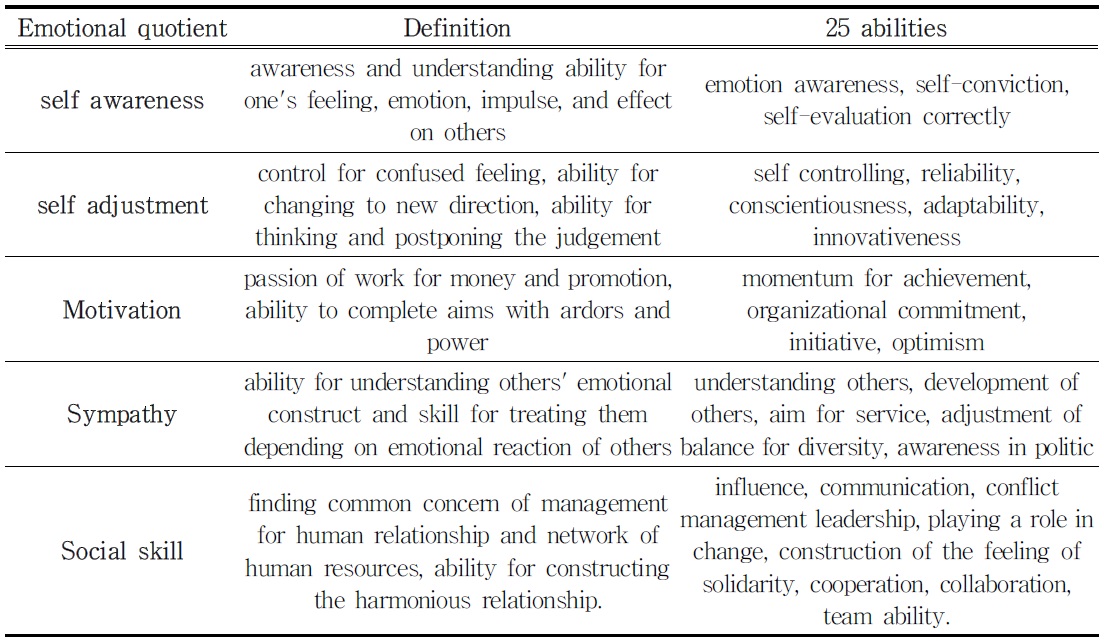
] re-categorized emotional ability
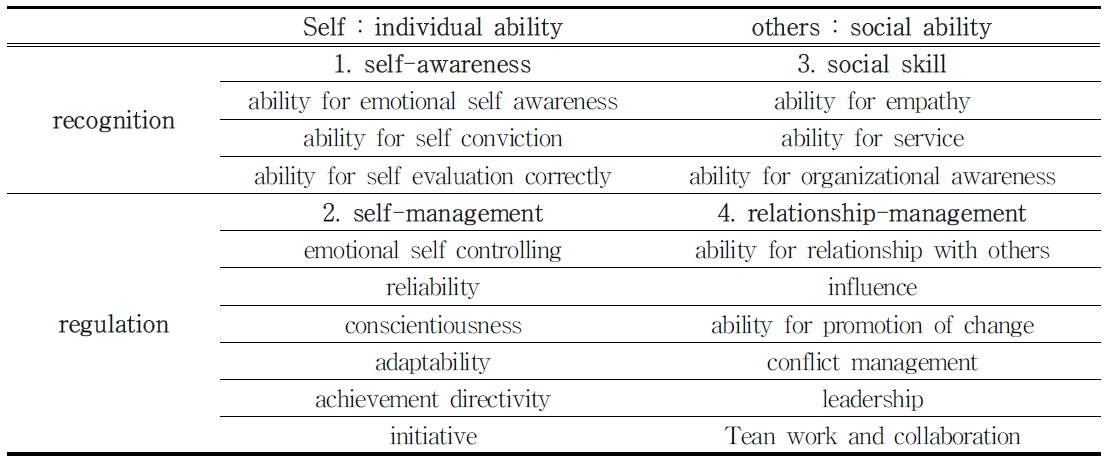
] The analysis of previous research

1. Research Model and Analysis Method
2. Organization of Research Variables and Technology Statistics
] Demographic characteristics of subjects

] Explanation of variables and descriptive statistics
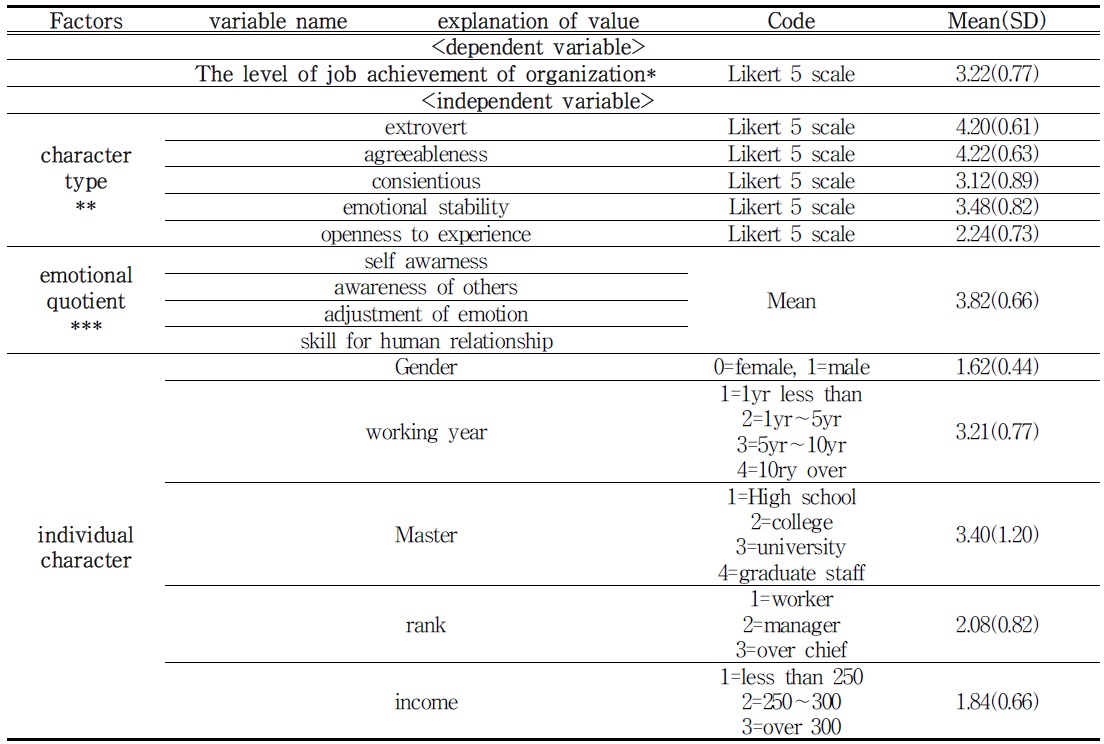
1. The analysis for influence of character type of members in organization on emotional quotient
] The analysis of influence of character type on emotional quotient
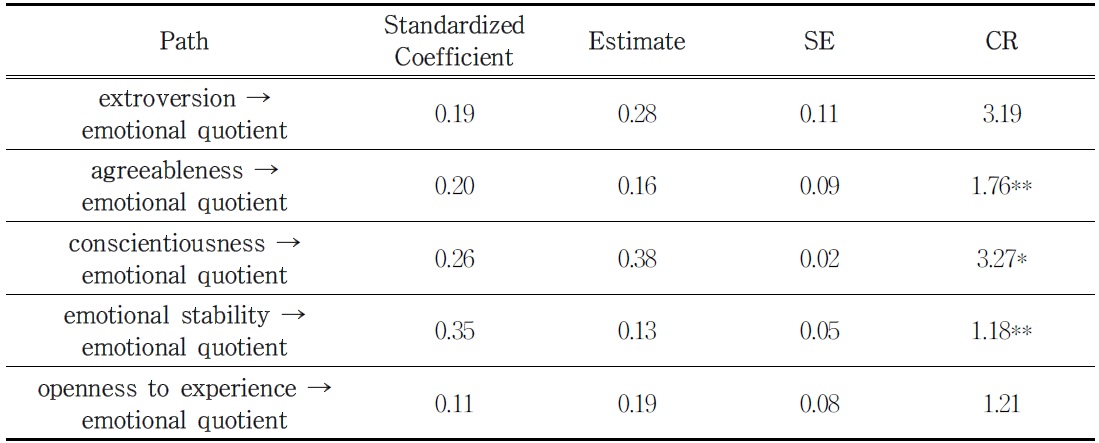
2. The influence of emotional quotient of members in organization on systemicity
] The analysis of influence of emotional quotient of members in organization on systemicity

3. The analysis for mediator effect of emotional quotient of members in organization
] The analysis for influence of character type on systemicity
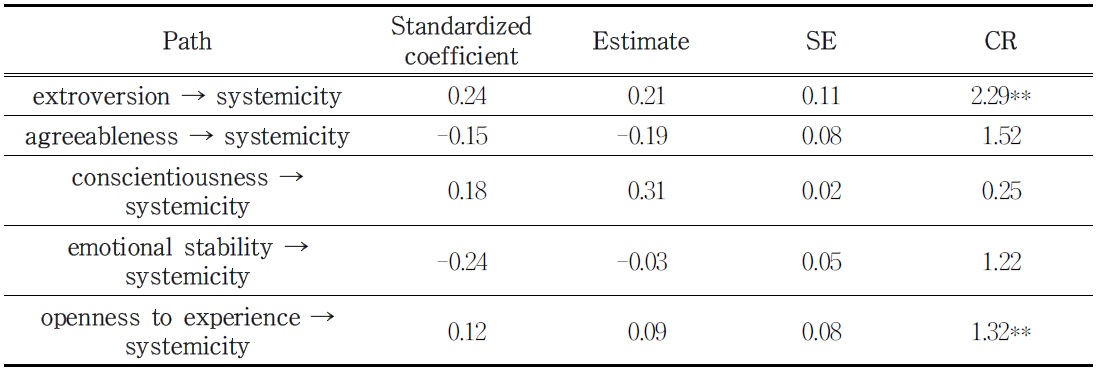
Ⅴ. Conclusions and Suggestions
참고문헌
이미지 / 테이블
[
<Table 1>
]
The kinds of Emotion
 [
<Table 2>
]
re-categorized emotional ability
[
<Table 2>
]
re-categorized emotional ability
 [
<Table 3>
]
The analysis of previous research
[
<Table 3>
]
The analysis of previous research
 [
<Figure. 1>
]
Research Model
[
<Figure. 1>
]
Research Model
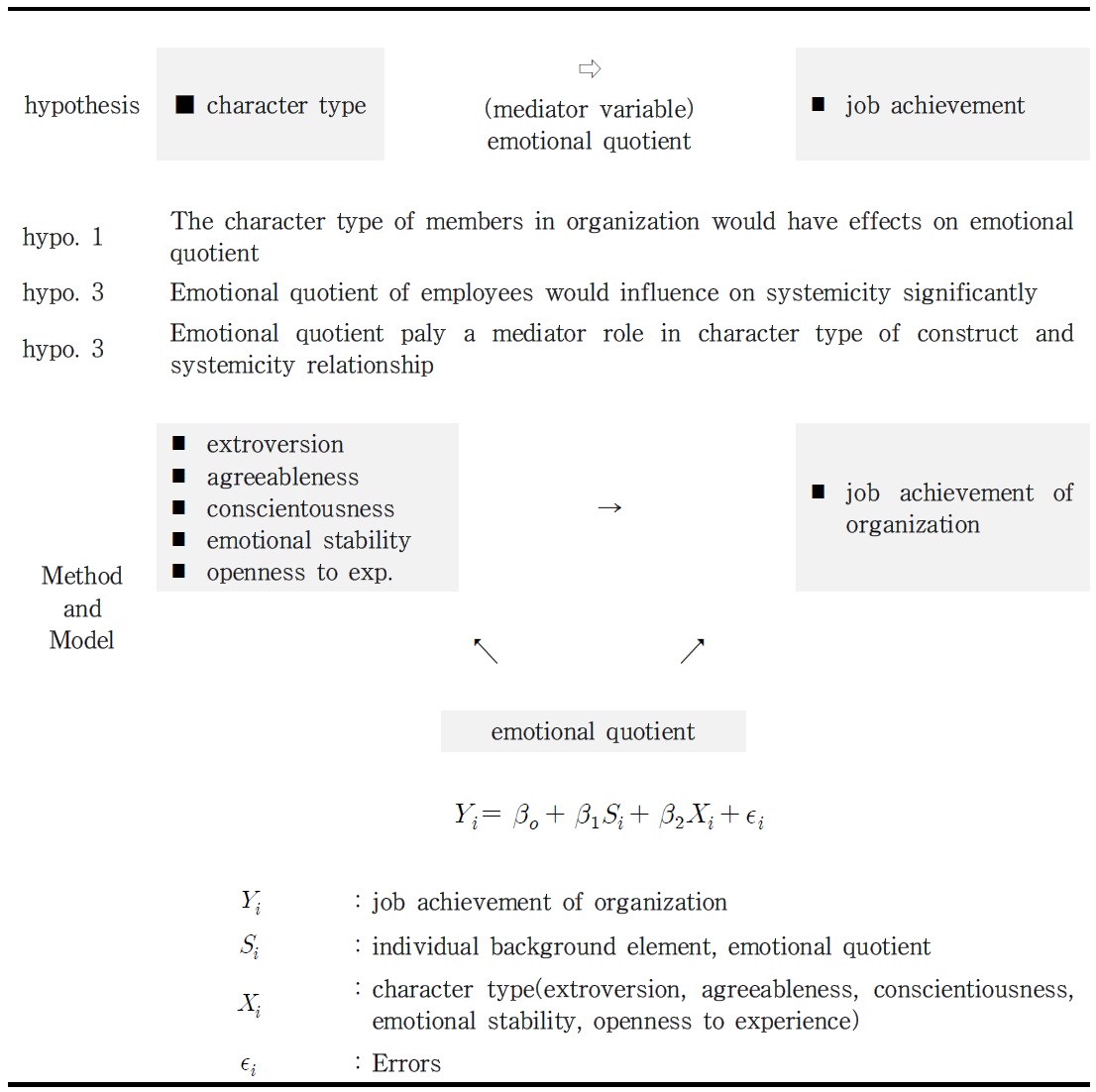 [
<Table 4>
]
Demographic characteristics of subjects
[
<Table 4>
]
Demographic characteristics of subjects
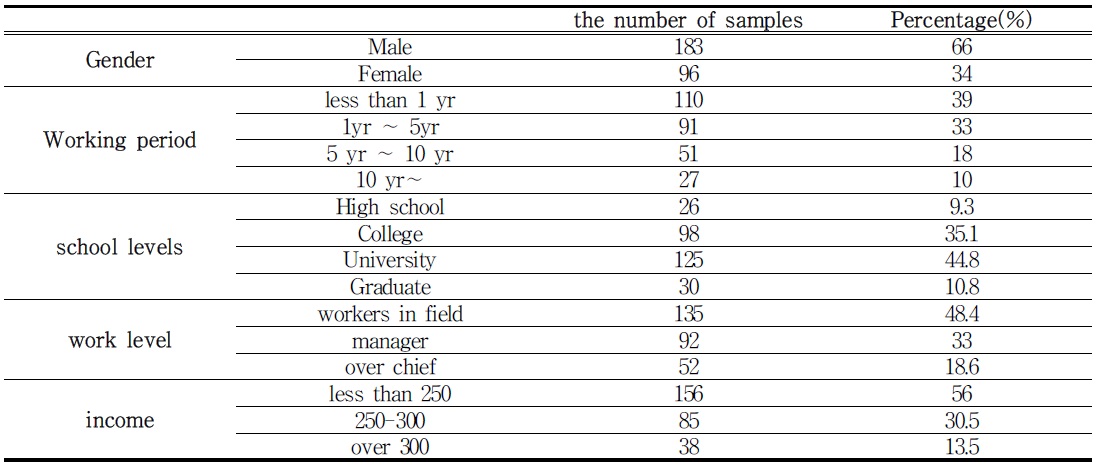 [
<Table 5>
]
Explanation of variables and descriptive statistics
[
<Table 5>
]
Explanation of variables and descriptive statistics
 [
<Table 6>
]
The analysis of influence of character type on emotional quotient
[
<Table 6>
]
The analysis of influence of character type on emotional quotient
 [
<Table 7>
]
The analysis of influence of emotional quotient of members in organization on systemicity
[
<Table 7>
]
The analysis of influence of emotional quotient of members in organization on systemicity
 [
<Table 8>
]
The analysis for influence of character type on systemicity
[
<Table 8>
]
The analysis for influence of character type on systemicity
